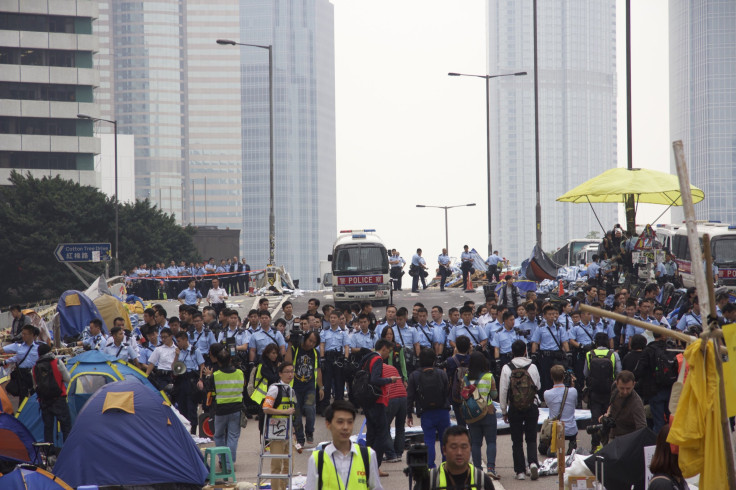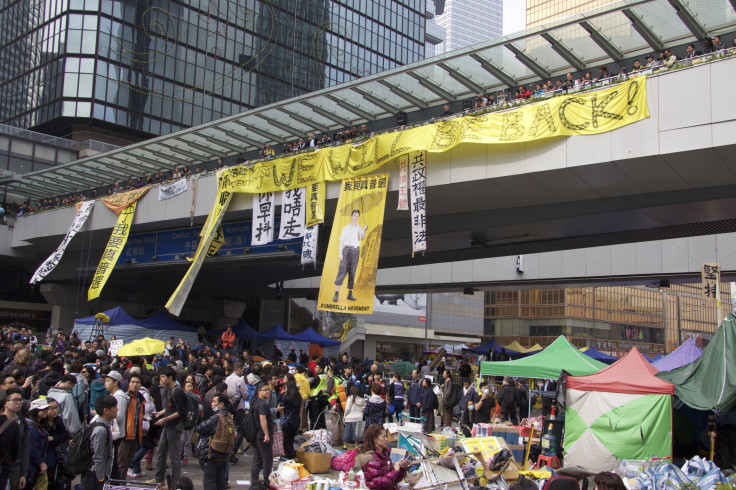Occupy Hong Kong: As Police Cleared Protest Site, Activists Say Movement Will Continue [PHOTOS]

HONG KONG -- As authorities cleared the main Occupy Central protest site in the city, many protesters hoped that the action represents the end of the beginning, rather than the beginning of the end, of the movement.
Police and bailiffs, acting to enforce a court order ordering the protesters' removal, moved in Thursday and began removing barricades and tents, warning those who refused to vacate the site would be arrested. However, even before the clearing action began, scores of protesters, who have occupied the site in the heart of Hong Kong for over two months, could be seen packing up tents and belongings on their own, not waiting for the police to reach their makeshift campsites.
Organizers from the various supply depots, organized by student groups to provide the protesters with food, water and medical supplies, accosted passersby, asking them to take away bottles of water, or medical disinfectant. In their midst walked curious executives from the nearby office towers, as well as tourists and joggers, who passed through the disappearing protest camp for one final look.
“I think the occupation of the streets will end today, but the movement will still be here,” said Frank, 20, a representative for the Hong Kong Federation of Students, one of the protest groups that have been at the forefront of the movement. “I think we didn't achieve what we wanted with the system, but many of the people in Hong Kong have started to think more about politics, so I think that is the greatest gain.”
His colleague, David (both only wished to be identified by their first names), added: “Today we will finish the civil disobedience process. … [But] I think there will be a big mass action next year in April or May.
His comments echoed those of many protesters that International Business Times spoke to Thursday, best articulated by the banners hanging from bridges, posted on tents and chalked onto the city's streets: “We'll be back.”

“The protests will not end at this point. I believe the whole movement will go into a more mobile state, where people are more flexible in their movement,” said Henry Wo, 22, who was one of the volunteers trying to give away the inventory from a supply depot.
“Most of the people I've been with here believe that the protests should not stop now, but also that we shouldn't stay in this place too long, and create an excuse for the police to suppress the movement.
“There are a lot of proposals as to what will be next – that we come out every Monday to put pressure on the government, and on the Chinese, or coming out on New Year's Eve,” Wo added.
Following the clearance of the protest site at Mong Kok in October, protesters there have adopted new tactics, known locally as “shopping trips.” It involves groups of protesters walking the sidewalks of the busy shopping district en masse, allowing demonstrators to keep moving and avoid police action, while still disrupting the normal flow of the area.
“It's very reminiscent of Tiananmen ... there are a lot of similarities,” said Rose Tsang, 46, who survived the 1989 massacre of student protesters in Beijing's Tiananmen Square. “The legacy of this movement is civilians, students, not being afraid of this incredibly brutal and violent dictatorship, showing incredible courage.”
© Copyright IBTimes 2024. All rights reserved.





















